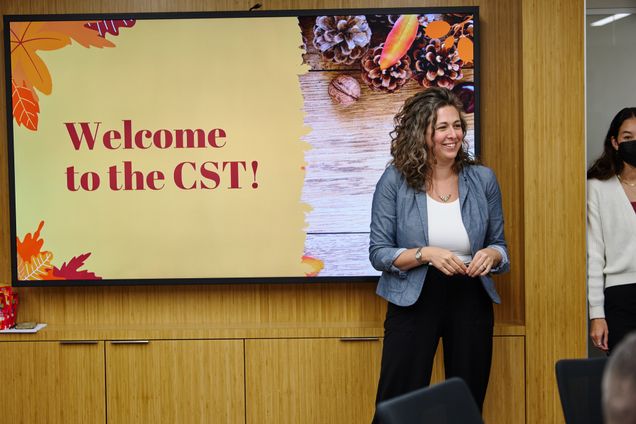CST Spotlight: Director Caroline Brinkert
CST Director Reflects on Recent Shifts in Stuttering Therapy

By Matthew Edwards, CST Adult Group Therapy Client
Center for Stuttering Therapy Director Caroline Brinkert, MS, CCC-SLP, has seen many shifts in the field of stuttering therapy across her career.
She notes that stuttering therapy mostly in the 1990s and early 2000s focused on fluency above all else, with clinicians primarily implementing fluency-shaping strategies with the goal of ‘fixing’ stuttering.
“The field then evolved as much research came out about the adverse impacts on the person experiencing stuttering,” Caroline says. “Regardless of how fluent or disfluent a person is, stuttering impacts their lived experiences, jobs, relationships and life. This led to working more holistically to address thoughts and feelings related to stuttering.”
“We need to support people who stutter, to be comfortable with acknowledging that stuttering is a part of their identity and for them to feel empowered and supported,” CST Director Caroline Brinkert says.
Approaches to stuttering therapy have further shifted in recent years due to greater societal and political movements, which offer parallels to stuttering.
“Really taking hold in the past two to three years is this idea of verbal diversity, where stuttering be considered part of a broader array of verbal diversity in the way that as a society, we’ve shifted to more inclusivity for a range of differences such as handicap accessibility and autism as a form of neurodiversity.”
Caroline, who officially took over as CST director from Diane Constantino in 2022, works to support people who stutter beneath the surface of what a listener sees or hears.
Through the CST’s approach, individuals are encouraged to live an authentic life, regardless of stuttering or not.
“I teach the students that our role is to be the passenger–not the driver–along this journey,” Caroline says. “We’re along for the ride and perhaps providing some guidance on which route to take. Maybe one route would feel more scenic or more supportive, but the route is ultimately determined and driven by our clients themselves.”
Significant shifts in the field have derived from stakeholders across the stuttering community accepting that stuttering does not always go away with therapy–or time.
Reflecting on her predecessor Diane, Caroline notes Diane was a forward thinker and very early in promoting a stuttering therapy philosophy of the whole individual.
Caroline says she had a really great roadmap from Diane and the social change movements gaining hold around the time she officially stepped into the director role in 2022. These allowed Caroline to embed a holistic, client-driven philosophy into all of the Center’s services—group or individual.
“We need to support people who stutter, to be comfortable with acknowledging that stuttering is a part of their identity and for them to feel empowered and supported,” Caroline says. “People who stutter can feel they have the autonomy to have control over their speech if they choose to, but there also isn’t necessarily a need to ‘fix’ stuttering.”